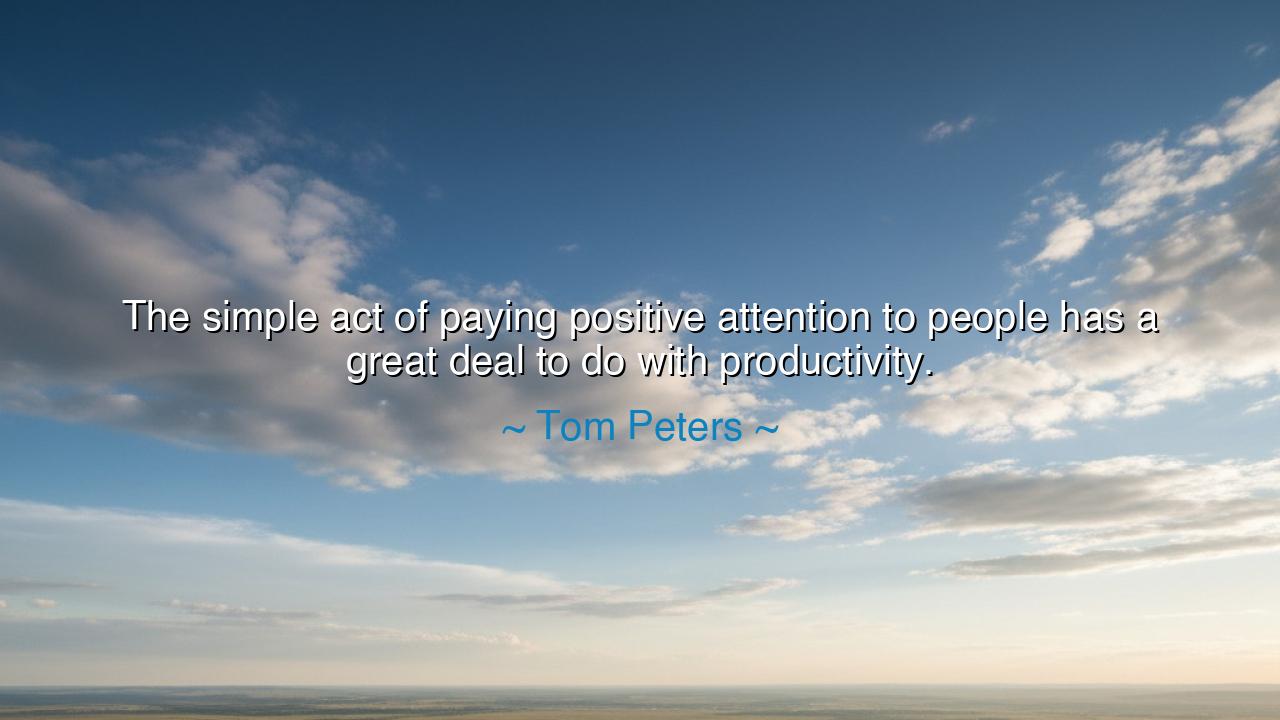
The simple act of paying positive attention to people has a
The simple act of paying positive attention to people has a great deal to do with productivity.






When Tom Peters declared, “The simple act of paying positive attention to people has a great deal to do with productivity,” he unveiled a truth that leaders, sages, and builders of nations have known since the dawn of civilization. His words remind us that greatness is never achieved in isolation, nor through fear and coercion, but through the nurturing of human spirit. To give positive attention is to affirm the dignity of another, to acknowledge their worth, and in so doing, to awaken in them the energy to create, to labor, and to thrive.
The ancients knew this wisdom well. In the writings of Xenophon, the disciple of Socrates, it is told that a good general does not merely command but also inspires, treating his soldiers not as expendable tools but as men whose loyalty grows when their humanity is honored. Likewise, the Confucian masters taught that when a ruler shows respect to his people, harmony and prosperity follow. Thus Peters’ insight is rooted in an old truth: that attention, given sincerely and with positivity, transforms the bonds between individuals into the foundation of collective achievement.
History offers us luminous testimony. Consider the leadership of Abraham Lincoln during the American Civil War. Amidst the storm of battle and the burdens of office, Lincoln often took time to visit soldiers in the field and write letters of thanks to ordinary citizens. These gestures of positive attention, simple though they were, bound his followers to him with a devotion that endured through hardship. His attentiveness was not weakness, but a force multiplier, fueling the courage of thousands who fought for the cause of union and liberty.
The meaning of Peters’ words also shines in the world of work and enterprise. When people are seen, heard, and valued, their energy flourishes. When they are neglected, reduced to mere numbers or cogs, their spirit withers and their productivity declines. A word of recognition, a gesture of gratitude, a leader’s willingness to truly listen—these are not luxuries but necessities, for they breathe life into the human effort that sustains every family, every community, every nation.
At the heart of this teaching lies the call to humility. To give positive attention requires us to look beyond ourselves, to recognize that others are not simply tools for our ambitions but fellow travelers, each bearing gifts and struggles. Attention is not flattery; it is the honoring of humanity. And when humanity is honored, it responds with loyalty, creativity, and strength.
The lesson is profound: never underestimate the power of small acts of recognition. In every sphere—home, work, or community—let your eyes see those who labor beside you. Speak words of encouragement when they are weary. Celebrate their contributions, however modest they may seem. In doing so, you will kindle fires of motivation that burn longer and brighter than any command or demand ever could.
In practice, this means cultivating mindfulness in your interactions. Look into the eyes of those who serve you and offer genuine thanks. If you lead, make it your duty to notice effort and acknowledge it openly. If you work alongside others, become a source of encouragement rather than criticism. In every exchange, remember that positive attention is not a small courtesy but a seed of productivity and shared success.
Therefore, let us take to heart Tom Peters’ wisdom: by paying positive attention to others, we unlock their best selves, and in doing so, we unlock the greatness of the whole. This is not mere management—it is the timeless art of leadership, the noble duty of every human being who wishes to build, to guide, and to inspire. For in seeing others, we lift them, and in lifting them, we lift ourselves.






HNHien Nguyen
I feel inspired by the idea that small, thoughtful interactions can drive productivity. I wonder whether this principle extends beyond work settings—can paying positive attention to family, friends, or students produce similar improvements in engagement and motivation? Additionally, how can organizations systematize positive attention without making it formulaic or impersonal? Exploring practical ways to integrate genuine recognition into daily routines could offer both personal and professional benefits.
MQNgo Minh Quan
This quote prompts me to consider whether positive attention impacts different personalities differently. For example, do introverted or highly self-critical employees respond as well to attention as more outgoing or confident ones? How can managers tailor recognition in ways that genuinely motivate everyone on their team? Understanding the subtleties of attention, encouragement, and productivity could provide actionable insights for cultivating a high-performing, psychologically safe work environment.
TTNguyen ThANH THAO
I’m curious about the connection between positive attention and long-term performance. Does recognizing and validating small efforts build momentum over time, or are there diminishing returns? Also, how does this principle translate to team dynamics—can paying attention to individuals enhance collaboration and collective output, or might it create perceived favoritism? Exploring these nuances could help understand how seemingly simple interpersonal behaviors can influence broader organizational effectiveness.
Nnguyenvietanh
Reading this makes me think about management styles. Could leaders who focus on positive attention see not just higher productivity but also better retention and morale? On the flip side, is there a risk of overdoing it, making praise feel performative or insincere? I’d like a perspective on how to strike the right balance between encouraging employees and maintaining authenticity, especially in high-pressure or results-driven organizations.
CVCuong Vo
This perspective is intriguing because it highlights the human element in productivity. I wonder, though, how consistent positive attention must be to have a measurable impact. Are there specific techniques for giving attention that genuinely motivate people, or is it more about sincerity and timing? I’d also like to explore whether this approach works universally across different types of workplaces, cultures, or personality types, or if it’s more effective in certain environments than others.